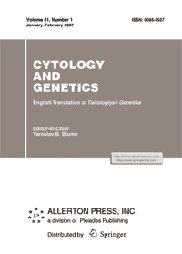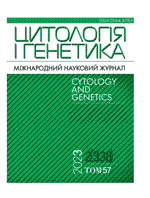SUMMARY. Coronavirus disease (COVID-19), which was first re-corded in China in December 2019, quickly spread to other countries and in a short period of time, the local outbreak escalated into a pandemic. There are significantly more cases of COVID-19 morbidity and mortality in European countries than in East Asia, where the disease was first detected. Such population differences are unique, especially for SARS-CoV-2 and are due to both socio-behavioral differences and features of the gene pool of the population of different countries. For infectious diseases, such as COVID-19, an important point is the genetic characteristics of individuals, which can determine its resistance or sus-ceptibility to infection. Therefore, studies of the factors of hereditary predisposition to SARS-CoV-2 infection, as well as severity and mortality are extremely relevant. After genotyping among the healthy population of Ukraine and collecting relevant data from some Euro-pean countries, we determined the correlation between morbidity, mortality from COVID-19 and the prevalence of genotype II in the populations of Ukraine and several European countries. There was a negative correlation between the carrier of genotype II and susceptibility to SARS-CoV-2 infection per 1 million population (R = –0.53, p < 0.05), so individuals with genotype II can be considered more resistant to infection SARS-CoV-2. Further study of the role of allelic variants of the ACE1 gene in the development of severity and complications affected patients of COVID-19, are promising for iden-tified of genetic markers for development of personalized therapy.
Keywords: COVID-19, SARS-CoV-2, morbidity, ACE1 gene, hereditary predisposition

Full text and supplemented materials
References
1. Anastassopoulou, C., Gkizarioti, Z., and Patrinos, G.P., Human genetic factors associated with susceptibility to SARS-CoV-2 infection and COVID-19 disease severity, Hum. Genomics, 2020, vol. 4, pp. 1–8. https://doi.org/10.1186/s40246-020-00290-4
2. Bellone, M. and Calvisi, S.L., ACE polymorphism and COVID-19-related mortality in Europe, Mol. Med. (Berl.), 2020, vol. 98, pp. 1505–1509. https://doi.org/10.1007/s00109-020-01981-0
3. Borzyszkowska, J., Stanislawska-Sachadyn, A., Wirtwein, M., Sobiczewski, W., Ciecwierz, D., Targonski, R., Gruchala, M., Rynkiewicz, A., and Limon, J., Angiotensin converting enzyme gene polymorphism is associated with severity of coronary artery disease in men with high total cholesterol levels, J. Appl. Genet., 2012, vol. 53, pp. 175–182. https://doi.org/10.1007/s13353-012-0083-3
4. Brest, P., Refae, S., Mograbi, B., Hofman, P., and Milano, G., Host polymorphisms may impact SARS-CoV-2 infectivity, Trends Genet., 2020, vol. 36, no. 11, pp. 813–815. https://doi.org/10.1016/j.tig.2020.08.003
5. Freitas, A.I., Mendonca, I., Briyn, M., Sequeira, M.M., Reis, R.P., Carracedo, A., and Brehm, A., RAS gene polymorphisms, classical risk factors and the advent of coronary artery disease in the Portuguese population, BMC Cardiovasc. Disord., 2008, vol. 8, p. 15. http://www.biomed-central.com/1471-2261/8/15.
6. Hoffmann, M., Kleine-Weber, H., Schroeder, S., Krüger, N., Herrler, T., Erichsen, S., et al., SARS-CoV-2 cell entry depends on ACE2 and TMPRSS2 and is blocked by a clinically proven protease inhibitor, Cell, 2020, vol. 181, no. 2, pp. 271–280. e8. https://doi.org/10.1016/j.cell.2020.02.052
7. Itoyama, S., et al., ACE1 polymorphism and progression of SARS, Biochem. Biophys. Res. Commun., 2004, vol. 323, no. 3. https://doi.org/10.1016/j.bbrc.2004.08.208
8. Delanghe, J.R., Speeckaert, M.M., and de Buyzere, M.L., COVID-19 infections are also affected by human ACE1 D/I polymorphism, Clin. Chem. Lab. Med., 2020, vol. 58, no. 7, pp. 1125–1126. https://doi.org/10.1515/cclm-2020-0425
9. Li, W., Moore, M.J., Vasilieva, N., Sui, J., Wong, S.K., Berne, M.A., et al., Angiotensin-converting enzyme 2 is a functional receptor for the SARS coronavirus, Nature, 2003, vol. 426, no. 6965, pp. 450–454.
10. Manci Li, Schifanella, L., and Larsen, P.A., Alu retrotransposons and COVID-19 susceptibility and morbidity, Hum. Genomics, 2021, vol. 15, no. 1, p. 2. https://doi.org/10.1186/s40246-020-00299-9
11. Zhu, N., Zhang, D., Wang, W., Li, X., Yang, B., Song, J., Zhao, X., Huang, B., Shi, W., Lu, R., Niu, P., Zhan, F., et al., A novel coronavirus from patients with pneumonia in China, 2019, N. Engl. J. Med., 2020, vol. 382, pp. 727–733. https://doi.org/10.1056/NEJMoa2001017
12. Naoki, Y., Yasuo, A., Nao, N., Rain, Y., Georg, B., Takashi, G., Kunitada, S., and Masashi, M., SARS-CoV-2 infections and COVID-19 mortalities strongly correlate with ACE1 I/D genotype, Gene, 2020, vol. 758, p. 144944. https://doi.org/10.1016/j.gene.2020.144944
13. Ned, R.M., et al., The ACE I/D polymorphism in US adults: limited evidence of association with hypertension-related traits and sex-specific effects by race/ethnicity, Am. J. Hypertens., 2012, vol. 25, no. 2. https://doi.org/10.1038/ajh.2011.182
14. Novelli, A., Biancolella, M., Borgiani, P., et al., Analysis of ACE2 genetic variants in 131 Italian SARS-CoV-2-positive patients, Hum. Genomics, 2020, vol. 14, p. 29. https://doi.org/10.1186/s40246-020-00279-z
15. Ren, L.L., Wang, Y.M., Wu, Z.Q., et al., Identification of novel coronavirus causing severe pneumonia in human: a descriptive study, Chin. Med. J., 2020, vol. 133, no. 9, pp. 1015–1024. https://doi.org/10.1097/CM9.0000000000000722
16. Rigat, B., Hubert, C., Alhenc-Gelas, F., Cambien, F., Corvol, P., and Soubrier, F., An insertion/deletion polymorphism in the angiotensin I-converting enzyme gene accounting for half the variance of serum enzyme levels, J. Clin. Invest., 1990, vol. 86, no. 4, pp. 1343–1346. https://doi.org/10.1172/JCI114844
17. Saab, Y.B., Gard, P.R., and Overall, A.D.J., The geographic distribution of the ACE II genotype: a novel finding, Genet. Res. Camb., 2007, vol. 89, pp. 259–267.
18. Siváková, D., Lajdová, A., Basistová, Z., Cvácelová, M., and Blazícek, P., ACE insertion/deletion polymorphism and its relationship to the components of metabolic syndrome in elderly Slovaks, Anthropol. Anz., 2009, vol. 67, pp. 1–11. https://doi.org/10.1127/0003-5548/2009/0001
19. Tiret, L., et al., Evidence, from combined segregation and linkage analysis, that a variant of the angiotensin I-converting enzyme (ACE) gene controls plasma ACE levels, Am. J. Hum. Genet., 1992, vol. 51, no. 1.
20. Velavan, T.P. and Meyer, C.G., The COVID-19 epidemic, Trop. Med. Inter. Health, 2020, vol. 25, no. 3. https://doi.org/10.1111/tmi.13383
